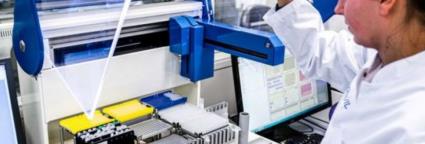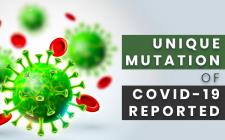Sequencing studies have demonstrated a mutation in the genome of SARS-CoV-2 that apparently occurred during the first quarter of 2020. The change resulted in substitution of glycine for aspartic acid at position 614 on the virus spike protein required for attachment to receptors on human  cells. The mutation termed G614 is now a consistent feature in isolates of the virus worldwide and is present in almost every strain sequenced. Molecular biologists believe that it may make the virus more transmissible but its effect on pathogenicity and species susceptibility has yet to be determined.
cells. The mutation termed G614 is now a consistent feature in isolates of the virus worldwide and is present in almost every strain sequenced. Molecular biologists believe that it may make the virus more transmissible but its effect on pathogenicity and species susceptibility has yet to be determined.
 Scientist speculate that the absence of obvious mutations among SARS-CoV-2 isolates may be a function of almost total susceptibility among humans infected with the virus. It is also reasoned that failure to evolve may be due to the fact that the virus occurred in human populations before it was recognized as a clinical entity in Wuhan, China in December 2019. A previous version of the virus that was less pathogenic may well have allowed spread without detection over an extended period in Southeast Asia.
Scientist speculate that the absence of obvious mutations among SARS-CoV-2 isolates may be a function of almost total susceptibility among humans infected with the virus. It is also reasoned that failure to evolve may be due to the fact that the virus occurred in human populations before it was recognized as a clinical entity in Wuhan, China in December 2019. A previous version of the virus that was less pathogenic may well have allowed spread without detection over an extended period in Southeast Asia.
Ongoing studies on the gene sequence of the virus coupled with serologic studies in populations in China and in neighboring nations will eventually provide evidence concerning the origin of the virus, involvement of wildlife reservoir hosts and variations in pathogenicity and infectivity over time. An understanding of the factors associated with infectivity and pathogenicity are critical to defining the epidemiology of COVID-19 and will contribute to early detection of the next emerging virus with pandemic potential